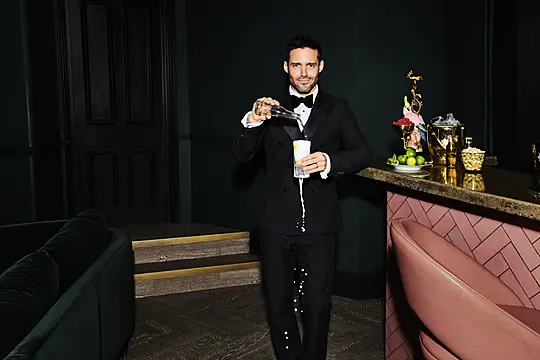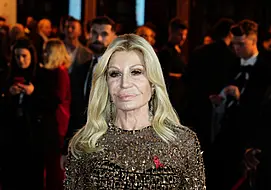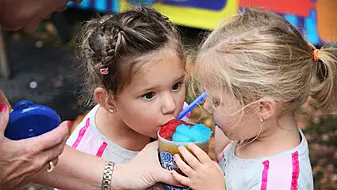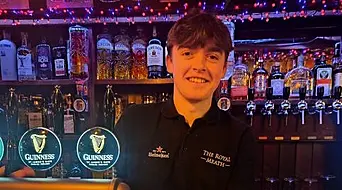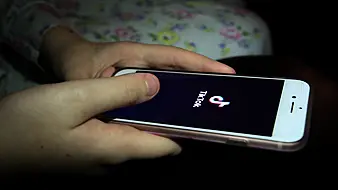Spencer Matthews found fame on Made In Chelsea, the award-winning reality drama which followed the love lives of a group of wealthy London 20-somethings.
But now at 32, the ex-Etonian says life couldn’t be more different from his boozy days on the popular show. He’s been married to Irish model Vogue Williams since 2018 and has two children – Theodore, two, and Gigi, six months.
He’s also sober, and a successful entrepreneur in his own right, having recently launched a low-alcohol liquor company called CleanCo.
“I’m not sure I’d know myself, or even be friends with myself, three years ago,” says Matthews, reflecting on all the changes. He says sobriety seemed a natural lifestyle choice ahead of the birth of his son.
“I remember Theodore was going to be born in a few months, and I was at the stage where I was drinking really rather very heavily, and it was going to be a big shock to the system. When you have kids, you realise it’s not really about you any more – suddenly you have to be ready and available for them at all times.”
That said, the TV star says there’s a difference between being teetotal and being sober, and there wasn’t a dramatic intervention moment where he finally said no to drinking. Like an increasing amount of people, he was simply ‘sober curious’ – interested in questioning his drinking habits for health-focused reasons.
“I choose not to drink alcohol but I don’t see it as an enemy,” he stresses. “I’m not in recovery and I don’t have an alcohol dependency issue; I just prefer living my life in a sober manner, having been drunk for a lot of my 20s and late teens.
“In the past, I’d drink to be social and I’d formed poor habits over time. I didn’t even realise I drank to excess in the way that I did, as it wasn’t this big looming problem. I wasn’t being sat down by my friends and being told they think there’s some kind of issue.”

His interest in sobriety led him to founding his low-alcohol drinks start-up, which has just raised funds to expand worldwide. The company, called CleanCo, uses traditional distilling methods to create ultra low-alcohol spirits – including rum and gin with 1.2% ABV that tastes remarkably like the real thing.
“Some of our products have extremely small amounts of alcohol in, but lots of day-to-day foods have trace amounts too. I’ll cook with wine and if there’s a bit of brandy in chocolate, I’ll have that too. Let’s just say, there’s more alcohol in a ripe banana then there is in a ‘clean’ gin and tonic, and I haven’t heard of anyone falling over from eating too many bananas,” he says with a laugh.
Matthews saw a gap in the market for people like him, who don’t class themselves as ‘problem drinkers’ as such, and still wanted to enjoy their favourite spirit on a Friday night. “It’s quite difficult to deprive yourself of something you want or desire – especially when you don’t think you have an issue,” he says.
“A lot of people aren’t alcoholics but probably feel like they drink a bit too much. I want to make that experience of having that ‘alcoholic’ drink as regular as you want it, but there just won’t be that impact the next day.”
As the low and no-alcohol drinks sector continues to grow, he believes we’ll see a shift in approaching alcohol as full-strength and low-strength, and there won’t be a stigma attached to drinking the latter on a night out at the local pub.
“When I decided to quit alcohol, there wasn’t anything to fill that gap. If I was in the pub, I’d have to order a Coca Cola and it makes you stick out negatively for making a positive decision, which is rare.
“If you decided you want to lose weight or take up running, most of your mates will think that’s a ‘good for you’ moment. Whereas if you don’t go out drinking, your mates think you’ve become boring. That’s a shame. I think the stigma around not drinking should change, so it’s not just socially acceptable but a positive thing.
“The younger generation are drinking a lot less anyway,” continues Matthews. He’s right – a recent report from the University of Sheffield found a trend in lower consumption and drunkenness levels among young people, and abstinence rates among 16-24 year-olds are on the rise too.
“Ben Branson, the founder of Seedlip [a non-alcoholic drinks brand], put it eloquently when he said that it’s not cool to be seen falling out of a nightclub at 4am any more, whereas when we were growing up, falling out of nightclubs drunk was pretty normal. In fact, you’d get a pat on the back for it.
“Now it’s just seen as somewhat embarrassing. I think kids spend their time and money on experiences they want to remember and share, whether that be on social media or with their friends. Times are different and alcohol plays a much smaller part in the younger generation’s lives than it did in ours.”
As he talks excitedly about the changing attitudes towards drinking culture, Matthews says he’s keen not to come across as too moralistic about giving up alcohol – especially given that his own partying days were documented in the media for the best part of a decade.
Having made drinking a less regular fixture in his evenings though, he only has good things to say about the positive impact cutting back has had on his life, and would encourage anyone curious about trying it to give it a go.
“I’m the kind of person where if I have one or two beers, I’ll become a bit inherently lazily. I’ll put stuff off until the next day and I’ll stay out for another hour. It really gets in the way for me,” he says. “My goals in life were completely unachievable when I was drinking alcohol and now they seem within reach.
“You sleep better, you wake up brighter, you’re more on it. I’m able to train at quite a high level very regularly,” adds Matthews, who has a strict fitness routine that sees him working out six days per week.
“Stuff is cleaner and crisper. Having said that, do I ever see myself having a glass of champagne on New Years Eve with my family? Yeah, why not. Or a delicious glass of lovely wine on holiday with my wife? Sure. The way I look at it is that I have complete control and balance of my work, love, life and responsibilities.”
With the future bright and his life seemingly in equilibrium, does he have any regrets about the ‘old Spencer’ he left behind?
“I wish I’d done less reality television, to be honest,” he laughs. “I probably would have left TV to pursue a career in business earlier.
“I’m finding it really hard as a young entrepreneur to break that mould of being ‘that guy’ from ‘that show’. It isn’t the end of the world, because it was a popular show, but my life is so different now.
“I kind of feel like saying to people, ‘Well what were you doing when you were 19? Do you want to be remembered for that for the rest of your life?’ It’s kind of an unfair label to carry, especially when you’re sober, because the two people are miles apart from each other.
“I try not to regret those things from my past though,” Matthews concludes. “As had I not lived those years of hedonism, the importance of what we’re doing now wouldn’t have been quite as potent for me.”
